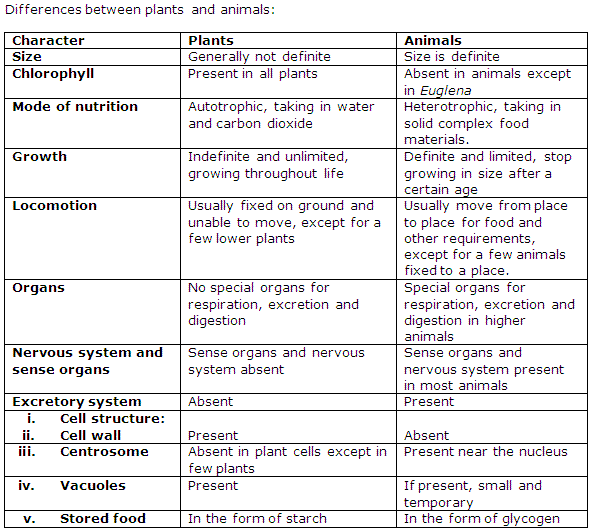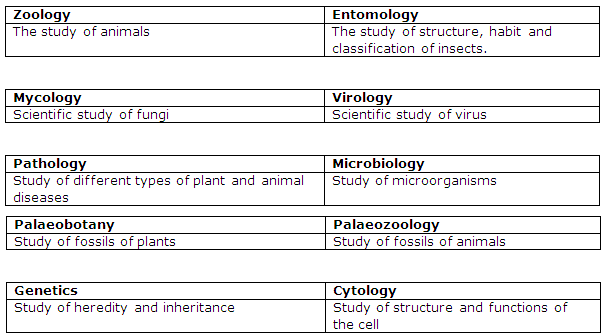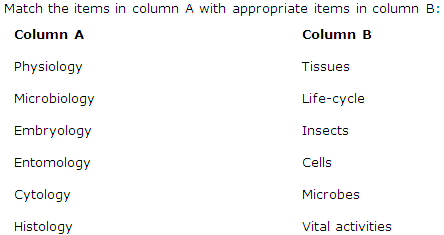Chapter 1 - An Introduction Exercise 6
Question 1
What is biology? What are the main branches of biology?
Solution 1
Biology is the branch of science dealing with the study of living organisms.
The two main branches of Biology are Botany and Zoology.
The two main branches of Biology are Botany and Zoology.
Question 2
Define biology. Write the importance of biology in our daily life.
Solution 2
Biology is the branch of science dealing with the study of living organisms including their structure, evolution, growth and environment.
Biology is important in our daily life in the following ways:
(i) Food - Study of various food components helps in understanding balanced diet and its significance. We get food directly or indirectly through agriculture, which is helped by the studies of different branches of Biology.
(ii) Health - Biology helps us to understand structure and functions of our various body parts as well the various diseases that we suffer from and their cure.
(iii) Agriculture - Biology helps us to increase the overall agricultural production by providing knowledge about new methods of farming, improved seed varieties and crop protection against many diseases.
(iv) Clothes - Materials for making clothes like wool, fur and silk are obtained from animals whereas cotton is obtained from plants. Biology deals with these animals and plants.
(v) Industry - Many industries are based on animal and plant products like leather, horn, shells, honey, wax, pearl, wood, rubber etc. Increased manufacture of these products can be achieved using the knowledge of Biology.
(vi) Human Diseases - Many animals cause and transmit diseases. Also many animals are used for testing new drugs before use on humans. The tremendous advances in human physiology, medicine and surgery have come from the study of zoology.
(vii) Aesthetic value - We keep many animals like birds, fishes and butterflies for entertainment and hobby. Visiting gardens and parks also gives us aesthetic pleasure. Biology helps in the study of these animals and plants to provide us better aesthetic value.
(viii) Improvement of domestic animals - Raising improved breeds of domestic animals gives better yields and this is made possible by zoology and genetics.
(ix) Space research - Biology helps in man's quest of knowing about extra terrestrial life.
Biology is important in our daily life in the following ways:
(i) Food - Study of various food components helps in understanding balanced diet and its significance. We get food directly or indirectly through agriculture, which is helped by the studies of different branches of Biology.
(ii) Health - Biology helps us to understand structure and functions of our various body parts as well the various diseases that we suffer from and their cure.
(iii) Agriculture - Biology helps us to increase the overall agricultural production by providing knowledge about new methods of farming, improved seed varieties and crop protection against many diseases.
(iv) Clothes - Materials for making clothes like wool, fur and silk are obtained from animals whereas cotton is obtained from plants. Biology deals with these animals and plants.
(v) Industry - Many industries are based on animal and plant products like leather, horn, shells, honey, wax, pearl, wood, rubber etc. Increased manufacture of these products can be achieved using the knowledge of Biology.
(vi) Human Diseases - Many animals cause and transmit diseases. Also many animals are used for testing new drugs before use on humans. The tremendous advances in human physiology, medicine and surgery have come from the study of zoology.
(vii) Aesthetic value - We keep many animals like birds, fishes and butterflies for entertainment and hobby. Visiting gardens and parks also gives us aesthetic pleasure. Biology helps in the study of these animals and plants to provide us better aesthetic value.
(viii) Improvement of domestic animals - Raising improved breeds of domestic animals gives better yields and this is made possible by zoology and genetics.
(ix) Space research - Biology helps in man's quest of knowing about extra terrestrial life.
Question 3
List the various differences between the animals and the plants.
Solution 3

Question 4
What are the advantages of study of biology?
Solution 4
Study of Biology is advantageous to us in many ways. These are:
(i) It helps us to understand ourselves better such as our body activities, our hereditary, our evolution, need for food, life and death etc.
(ii) It helps us to remain healthy and fit by knowing our body structure and functioning.
(iii) It tells us about the types of human diseases and their causes. It also helps in the prevention and cure of human diseases.
(iv) Biology ensures maximum utilization of resources available to us such as increasing crop production, improving breeds of useful animals, using microbes in food, industry and medicine, curing diseases and overall improving the quality of life.
(v) It informs us about the negative consequences of excessive use of fertilizers and pesticides like degradation of soil quality and harming living beings including humans through food chains.
(vi) Biology tells us about the problems of deforestation and its effects on the environment.
(vii) It makes us aware about the causes and harmful effects of pollution and ways of controlling it.
(viii) Biology stresses the need for conservation of natural resources, so that they are available to future generations.
(ix) It informs us about our responsibility towards other forms of life and our planet at large, for sustainable living.
(x) It makes us aware of the need to maintain the delicately balanced ecosystem containing various food chains and food webs.
(xi) Biology solves many problems facing mankind such as eradication of fatal diseases, decreasing environmental pollution, increasing food supply, recharging fresh water resources etc.
(i) It helps us to understand ourselves better such as our body activities, our hereditary, our evolution, need for food, life and death etc.
(ii) It helps us to remain healthy and fit by knowing our body structure and functioning.
(iii) It tells us about the types of human diseases and their causes. It also helps in the prevention and cure of human diseases.
(iv) Biology ensures maximum utilization of resources available to us such as increasing crop production, improving breeds of useful animals, using microbes in food, industry and medicine, curing diseases and overall improving the quality of life.
(v) It informs us about the negative consequences of excessive use of fertilizers and pesticides like degradation of soil quality and harming living beings including humans through food chains.
(vi) Biology tells us about the problems of deforestation and its effects on the environment.
(vii) It makes us aware about the causes and harmful effects of pollution and ways of controlling it.
(viii) Biology stresses the need for conservation of natural resources, so that they are available to future generations.
(ix) It informs us about our responsibility towards other forms of life and our planet at large, for sustainable living.
(x) It makes us aware of the need to maintain the delicately balanced ecosystem containing various food chains and food webs.
(xi) Biology solves many problems facing mankind such as eradication of fatal diseases, decreasing environmental pollution, increasing food supply, recharging fresh water resources etc.
Question 5
Describe five main branches of biology.
Solution 5
The five main branches of Biology are:
(i) Zoology - It is the study of animals
(ii) Botany - It refers to the study of plants
(iii) Microbiology - It refers to the study of microorganisms
(iv) Ecology- It deals with the study of relationship between living organisms and their environment.
(v) Pathology- It deals with the study of different types of plant and animal diseases.
(i) Zoology - It is the study of animals
(ii) Botany - It refers to the study of plants
(iii) Microbiology - It refers to the study of microorganisms
(iv) Ecology- It deals with the study of relationship between living organisms and their environment.
(v) Pathology- It deals with the study of different types of plant and animal diseases.
Question 6
Write down the definition of zoology and botany.
Solution 6
Zoology is the branch of Biology dealing with the study of animals.
Botany is the branch of Biology dealing with the study of plants.
Botany is the branch of Biology dealing with the study of plants.
Question 7
Define the following terms:
(a) Morphology
(b) Histology
(c) Ecology
(d) Genetics
(e) Biochemistry
(f) Pathology
(a) Morphology
(b) Histology
(c) Ecology
(d) Genetics
(e) Biochemistry
(f) Pathology
Solution 7
(a) Morphology is the study of the form and structure of living organisms.
(b) The study of tissues of organisms with the help of microscopes is called histology.
(c) Ecology is the branch of biology dealing with the study and relationship of environment with living organisms and its effect on structure, distribution and habitat.
(d) Genetics is defined as the study of heredity and inheritance.
(e) Biochemistry is the study of the metabolic activities of chemical materials.
(f) Pathology is the branch of Biology dealing with the study of different types of plant and animal diseases, their symptoms, causative agents and methods of control.
(b) The study of tissues of organisms with the help of microscopes is called histology.
(c) Ecology is the branch of biology dealing with the study and relationship of environment with living organisms and its effect on structure, distribution and habitat.
(d) Genetics is defined as the study of heredity and inheritance.
(e) Biochemistry is the study of the metabolic activities of chemical materials.
(f) Pathology is the branch of Biology dealing with the study of different types of plant and animal diseases, their symptoms, causative agents and methods of control.
Question 8
Answer the following in one word or a sentence:
(a) In which branch of biology you learn about fossils?
(b) Who is known as the father of biology?
(c) Who coined the term biology and when?
(d) In which branch of biology do you study the relationship between organism and environment?
(e) In which branch of biology do you study the borne deformities of human beings?
(f) Who is known as the father of botany?
(a) In which branch of biology you learn about fossils?
(b) Who is known as the father of biology?
(c) Who coined the term biology and when?
(d) In which branch of biology do you study the relationship between organism and environment?
(e) In which branch of biology do you study the borne deformities of human beings?
(f) Who is known as the father of botany?
Solution 8
(a) Paleontology / Palaeobiology
(b) The Greek philosopher, Aristotle
(c) Lamarck and Treviranus coined the term Biology in 1801.
(d) Ecology
(e) Teratology
(f) Theophrastus
(b) The Greek philosopher, Aristotle
(c) Lamarck and Treviranus coined the term Biology in 1801.
(d) Ecology
(e) Teratology
(f) Theophrastus
Chapter 1 - An Introduction Exercise 7
Question 1
Differentiate between the following pairs of terms:
(a) Zoology and Entomology
(b) Mycology and Virology
(c) Pathology and Microbiology
(d) Palaeobotany and palaeozoology
(e) Genetics and Cytology
(a) Zoology and Entomology
(b) Mycology and Virology
(c) Pathology and Microbiology
(d) Palaeobotany and palaeozoology
(e) Genetics and Cytology
Solution 1

Question 2
Name any three areas of biology which have specially developed recently.
Solution 2
Areas of Biology which have developed recently are:
(i) Enzymology
(ii) Immunology
(iii) Genetic Engineering
(iv) Radiation Biology
(v) Forensic Science
(vi) Biophysics
(vii) Cybernetics
(Write any three)
(i) Enzymology
(ii) Immunology
(iii) Genetic Engineering
(iv) Radiation Biology
(v) Forensic Science
(vi) Biophysics
(vii) Cybernetics
(Write any three)
Question 3
Every question below has four options. Choose the correct answer.
(i) The biology is the study of
(a) human body
(b) all living beings
(c) animals only
(d) digestion in animals
(ii) Which sequence forms the system?
(a) Cell, organ system and tissue
(b) Cell, tissue, organ system
(c) Cell, organ tissue system
(d) Organ, cell, tissue system
(iii) The term biology was coined by
(a) Lamarck and Treviranus
(b) Theophrastus
(c) Huxley
(d) Purkinje
(iv) Plants and animals are similar in
(a) respiration in day only
(b) respiration in night only
(c) respire all the time
(d) respiration whenever necessary
(v) The branch of biology which deals with the study of heredity is
(a) cytology
(b) genetics
(c) genetic engineering
(d) eugenics
(i) The biology is the study of
(a) human body
(b) all living beings
(c) animals only
(d) digestion in animals
(ii) Which sequence forms the system?
(a) Cell, organ system and tissue
(b) Cell, tissue, organ system
(c) Cell, organ tissue system
(d) Organ, cell, tissue system
(iii) The term biology was coined by
(a) Lamarck and Treviranus
(b) Theophrastus
(c) Huxley
(d) Purkinje
(iv) Plants and animals are similar in
(a) respiration in day only
(b) respiration in night only
(c) respire all the time
(d) respiration whenever necessary
(v) The branch of biology which deals with the study of heredity is
(a) cytology
(b) genetics
(c) genetic engineering
(d) eugenics
Solution 3
(i) (b) All living beings
(ii) (b) Cell, tissue, organ system
(iii) (a) Lamarck and Treviranus
(iv) (c) respire all the time
(v) (b) genetics
(ii) (b) Cell, tissue, organ system
(iii) (a) Lamarck and Treviranus
(iv) (c) respire all the time
(v) (b) genetics
Question 4

Solution 4
Physiology - Vital activities
Microbiology - Microbes
Embryology - Life-cycle
Entomolgy - Insects
Cytology - Cells
Histology - Tissues
Microbiology - Microbes
Embryology - Life-cycle
Entomolgy - Insects
Cytology - Cells
Histology - Tissues

0 comments:
Post a Comment